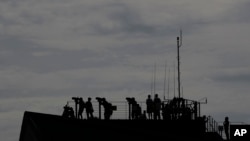Russia used its U.N. Security Council veto Thursday to end monitoring of U.N. sanctions against North Korea, after the monitors reported on Moscow’s violations.
“Today’s vote will only embolden the DPRK to act with further impunity, as the DPRK jeopardizes global security through the development of long-range ballistic missiles and sanctions evasion efforts,” said U.S. envoy Robert Wood.
DPRK is the abbreviation for North Korea's official name, the Democratic People's Republic of Korea.
While the monitors’ work will be halted, the sanctions remain in effect, and the Security Council sanctions committee will continue to oversee their implementation.
Several council members said the reason Russia wants the panel of experts disbanded is because in its most recent report in February, it details prohibited transfers of military equipment and munitions from North Korea to Russia, for use in its war in Ukraine. Moscow has denied the allegations.
“At this moment, Russia seems to be more interested in embracing or encouraging the DPRK for its provision of munitions and ballistic missiles for the conduct of its war in Ukraine at the expense of nuclear non-proliferation regime and the proper functioning of the Security Council,” said South Korean Ambassador Joonkook Hwang.
Japan’s envoy said Russia’s veto was “irresponsible and shameful,” especially as it was being used to defend North Korea’s unlawful weapons programs.
“It’s no exaggeration to say that we are standing at a critical historical juncture for ensuring nonproliferation of WMDs in the future,” Ambassador Yamazaki Kazuyuki said. “Nobody, except for the proliferators, would benefit from weaking the global non-proliferation regime.”
Since 2006, the council has adopted several sanctions resolutions intended to limit North Korea's access to funds and materials for its illicit nuclear and ballistic missile weapons programs. The council created the panel of experts in 2009, and since then they have documented implementation and alleged violations of council resolutions.
But despite tough sanctions, Pyongyang continues to advance its weapons programs. Just last week, it carried out three ballistic missile tests and in November it put a military satellite into orbit.
“In this context, who can seriously doubt the need to have an independent panel of experts allowing us to document the violations of this council’s resolutions?” asked France’s ambassador, Nicolas de Riviere.
Russia’s envoy said sanctions have not achieved their aim of normalizing the situation in the Korean Peninsula. Vassily Nebenzia added that the monitors have become a “weapon” of Western countries and are focusing their work on “trivial matters” unrelated to the problems on the Korean Peninsula. He said the sanctions regime needs updating.
“Against this backdrop, Russia has called for the council to adopt a decision to hold an open and honest review of the council sanctions measures in respect of the DPRK, moving the restrictions onto an annual basis,” Nebenzia said.
He suggested that if the council reviewed sanctions annually, it might provide an incentive for Pyongyang to engage in dialogue.
Russia will have to go before the U.N. General Assembly in the next 10 days to explain its veto.
China abstained on the vote.
“And China, with its abstention, has once again shown us where it stands on curbing DPRK proliferation,” U.S. Ambassador Wood said.
Ahead of the meeting, U.S. Ambassador Linda Thomas-Greenfield was joined by her council counterparts from Ecuador, France, Japan, Malta, Sierra Leone, Slovenia, South Korea, Switzerland, and the United Kingdom in a statement expressing support for the monitors. She noted that North Korea has launched more than 100 ballistic missiles since 2022, and its state-supported cyber activities are a threat to the international community.
“In the face of these repeated attempts to undermine international peace and security, the panel’s work is more important now than ever before,” Thomas-Greenfield said on behalf of the 10 council members.
Swiss Ambassador Pascale Baeriswyl, who heads the council’s North Korea sanctions committee, told reporters after the vote that she hopes a solution can still be found regarding the monitors, adding “not all doors are closed.”




